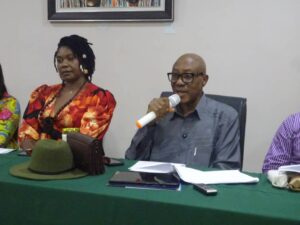Palliative in Higher Degrees (PHDs) and the Dissonance between certificates and expected skills

By Chukwunonso E.C.C. Ejike
The word palliative has earned a notoriously exalted position in the Nigerian social and political lexicon for a variety of reasons. Prior to the year 2015, the word was mostly associated with medical practice where it refers to “care-giving approach aimed at optimising quality of life and mitigating suffering among people with serious, complex and often terminal illnesses. It does not usually address the underlying disease. Thanks to the activities of Professor Yemi Osinbajo as Vice-President of Nigeria between 2015 and 2023, and that of the government he served, Nigerians began to receive palliatives, not in hospitals, but in markets, village squares, offices, stadia, schools, etc. Nine years after, Nigerians still receive palliatives, Nigerians even die trying to receive palliatives, and Nigerians now loot palliatives from government warehouses; yet their economic conditions are anything but better. Interestingly, Professors in the Nigerian University system appear to have caught the bug (likely) from their colleague who was in government and are now dishing out Palliatives in Higher Degrees, PHDs.
Ordinarily, the PhD is an acronym for Doctor of Philosophy. Philosophy is the branch of learning that is unequivocally the father of all disciplines. It is derived from the Greek words Philo (love) and Sophia (wisdom). Loosely therefore, it could translate to love of wisdom. Indeed the gentlemen who gathered around the islands of Ionia to contemplate natural phenomena, and apply reason to attempt explaining them, were rightly called philosophers lovers of wisdom by the Greeks. Thus philosopher became the name given to those who exhibited some elevated intellect and interest in theorizing about natural phenomena. From Socrates, Plato and Aristotle, to Copernicus, Galileo and Newton, and to Pasteur, Darwin and Einstein, they were all philosophers. I have deliberately mentioned Einstein for even up till the first half of the 20th century, people who today are known as Mathematicians, Physicists, Biochemists, etc., were simply referred to as philosophers. It is on this premise that anyone who is awarded the PhD is expected to be one who is not just a philosopher, but a king of philosophy (of sorts).
Sometime in 2018, I had the privilege of reading a letter written to a Vice-Chancellor by someone who had just been awarded a PhD by a second generation university in Nigeria. The letter was so badly written that it lacked both logic and language. Not one sentence in the entire letter was free from blemish. A colleague struggled to make lame excuses for this freshly minted PhD by saying that the degree was in Economics and not in English language. I thought that was disingenuous for even if one assumed (without conceding) that language waivers may be granted a PhD Economics degree holder, it was difficult to explain or wish away the clear lack of logic in the letter. The fact that the said letter was written in response to being queried for not teaching assigned courses spoke to a different type of blemish.
In the last few years, I have had the opportunity to serve in different interview panels and to examine the theses of doctoral candidates in Nigerian universities and in universities abroad. This has given me the opportunity to interact with PhD holders from a wide spectrum of universities in Nigeria, and to compare PhD candidates from universities in Nigeria and those from foreign universities. In 2022, in an interview panel, a young man with a PhD in Chemistry from a first generation university in Nigeria was asked the title of his thesis. He had defended it a year earlier. Unfortunately, he could not remember his thesis title. When asked what the major contribution to knowledge from his doctoral research was, he stuttered a bit and began to perspire profusely. Finally, he was asked to distinguish between an acid and a base; and he immediately went on his knees, both hands in the air, tears streaming down his well-groomed face, his torso quivering vigorously. He aggressively employed argumentum ad misericordiam of an order I do not pray to witness ever again. It reminded me of an experience around 2010 when an external examiner for an M.Sc. candidate in Organic Chemistry was told by a student (who worked in a commercial bank) that he was so busy pursuing his targets that he gave his supervisor money with which someone was hired to conduct the experiments and write the report. A frank student you may say! The worrisome part is that the student did not understand why such an act should cause any furore or the revolt the examiner could not hide.
In 2015, an acquaintance of mine requested that I link him up to a Professor friend of mine in Canada so he could carry out the bench-work for his doctoral thesis in the Professors laboratory. This acquaintance claimed to have written dozens of e-mails to the Professor without getting a response. I introduced them via an e-mail and when the Professor accepted to host my acquaintance, the latter wrote back to say he was too busy (with administrative work in the establishment where he worked) to travel to Canada. He only wanted to send samples to Canada and receive results after a while. Of course, the relationship broke down immediately and I received some tongue-lashing from my Professor friend who wondered what sort of a doctoral student did not have time to do his research but wanted to get credit for someone elses laboratory man-hours. A few years later, this acquaintance called to mock me and my friend and to announce to me that he had been awarded a PhD. As I write, he is being considered for appointment as Professor in a Nigerian university!
In the course of serving as external examiner for doctoral candidates in the field of Biochemistry for a variety of public universities in Nigeria, I have come to observe an increasing trend in the practice of contracting virtually all the research work, data analyses, and the bulk of thesis writing to third party contractors, by students. Even after plagiarism checks, when students are advised to revise their drafts to reduce cases of similarities and plagiarised content, my observation is that they simply submit the same document to vendors who use IT applications/bots to re-work the sentences, often sacrificing meaning and logic in the process. On many occasions, the supervisors are not just aware of this wrong and dangerous practice but also enable it. The oft-cited excuse is the lack of equipment for conducting certain kinds of research. I have nonetheless consistently insisted that elegant science is not done by expensive equipment, but by creative minds capable of logically addressing problems. The easily identifiable problem with outsourcing doctoral (and indeed any) research is that the candidate could eventually graduate with the degree but not acquire the expected associated skills.
The lack of expected associated skills often manifests first in the course of oral examinations for doctoral candidates. Very often, I receive a thesis or dissertation for examination and the lack of philosophy is so glaring that one wonders how a supervisor and Department accepted to process such a candidate for examination. Worse still, on many occasions, the candidate lacked an understanding of the basics of the field, the methods used or the implications of the results obtained. When I bring this up with colleagues, the usual response is a silent resignation to fate. The lamentations are usually of the nature: The candidate has spent many years; he is beginning to pester me; so I decided to offload him. At other times, one would hear sentiments such as So so and so big man or pastor or even Professor has been on my neck so I decided to let the student go, so I can have my peace. I usually remind colleagues that these people we offload are usually the ones who will travel to Abuja and return with appointment letters as lecturers in the Department. Therefore the peace we get by offloading them often enables them tear the system to pieces.
On one occasion, after I had insisted that a particular PhD candidate had failed the oral examination, an elderly and respected Professor informed me, quite gently, that very few examiners read the theses sent to them as thoroughly as I do. He argued that the danger was that I may inadvertently deny a candidate a PhD when others who are worse than the candidate had been scored an A grade by a benevolent or understanding examiner who did not read the thesis. Members of the panel of examiners all agreed with him. Indeed, I have had to recommend major corrections to the satisfaction of the external and internal examiners on a number of occasions and never heard anything again from the Department. Sometimes one hears that the students abandoned the programme or that the Department invited a friendly external examiner to conduct a fresh examination for the candidate. In contrast, I do not have these sad experiences when I examine candidates for universities abroad, not even those in South Africa. I must nonetheless add that in Nigeria, occasionally, one comes across a bright student, with an excellent thesis, who rekindles hope that there are still, out there, remnants of incarnates of the old stock of philosophers. Sadly, they are too few and far between; and exist like the good seeds suffocated by thorns in the biblical parable of the sower.
For any society to make any meaningful progress on the path of development, it must take the role of knowledge creation and advancement seriously. A society desirous of ending the scourge of diseases and poverty, and ushering in economic prosperity, must be deliberate about its systems for minting thinkers, philosophers and PhDs. Universities are the factories for this production. It has become clear to me that Professors in our universities, acting as supervisors and as heads of the different academic units/branches of the university have resorted to distributing Palliatives in Higher Degrees, PHDs, to Nigerians just like the politicians distribute palliatives that send the people further down the poverty pit. It is difficult to pretend that a group of people as educated as we (Professors) are do not realise the import of our actions and inactions. Just like its relative in the family of maladies afflicting higher education in Nigeria, sexually transmitted degrees (STDs), PHDs are responsible for the dissonance between higher degree certificates and the skills truly possessed by the certificate holder. This dissonance, if not urgently addressed, will put the nail on the coffin of postgraduate education in Nigeria.
Chukwunonso E.C.C. Ejike, PhD, is a Professor of Medical Biochemistry and a former Dean of the School of Postgraduate Studies of AEFUNAI. He writes from Abakaliki.









